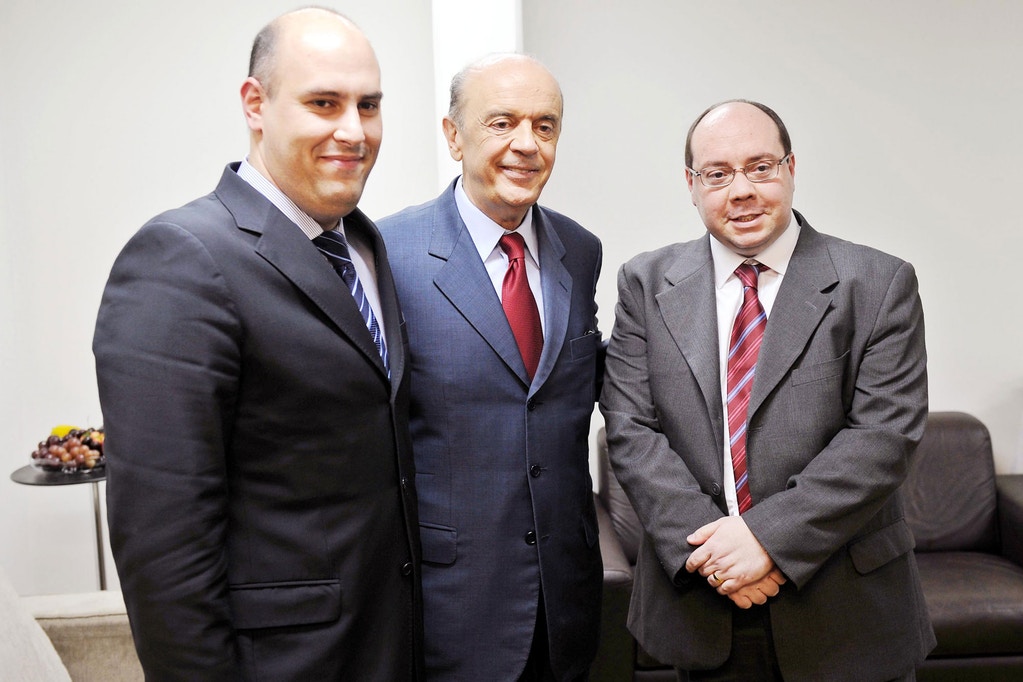Meet the Team behind CNN Brasil: A Businessman Accused of Exploiting Slave Labor and an Executive from a Fox News-style Outlet
MEDIA, 28 Jan 2019
Piero Locatelli and Andrew Fishman – The Intercept

From left, Brazilian Member of Congress Eduardo Bolsonaro, Douglas Tavolaro, President Jair Bolsonaro, and Rubens Menin sat down for a meeting at Planalto Palace in Brasilia, Brazil, on Jan. 18, 2019 to discuss the country’s newest cable news network, CNN Brasil.
Photo: Office of the President, Brazil
20 Jan 2019 – Last Monday [14 Jan], CNN announced that it will launch a Portuguese-language channel in Brazil. The U.S.-based cable news channel will roll out the latest foreign operation to bear the CNN brand through a license. However, the scandal-prone records of the two Brazilian partners behind the venture are already raising questions over the forthcoming channel’s credibility.
Principal funding for the venture will come from the new channel’s chair of the board, Rubens Menin, a construction magnate who is a vocal cheerleader for far-right Brazilian President Jair Bolsonaro and whose company has been caught multiple times using modern slave labor. CNN Brasil also announced that it will bring on Douglas Tavolaro as its CEO. Tavolaro previously served as vice president for news of Rede Record, a channel that in 2018 earned the nickname “Fox News Brasil” for its fawning coverage of Bolsonaro’s presidential campaign and the preferential access it secured as a result. When orders from on high at Record demanded that journalists cease criticism of Bolsonaro and increase negative coverage of his competitor, a minor staff revolt ensued and multiple journalists resigned in protest.
On Friday, the two figures behind CNN Brasil — Menin and Tavolaro — met with Bolsonaro and his son Eduardo at the presidential palace. Earlier this week, Eduardo tweeted his skepticism of the new outlet.
CNN Brasil said it plans to hire 400 journalists and begin operations during the second half of 2019. A press release noted that the 24-hour news channel will have total editorial independence, as well as the rights to rebroadcast CNN’s non-Portuguese language content. CNN Brasil appears to be swimming against the tide in an industry in which wave after wave of layoffs in major TV and print news organizations have thinned out Brazil’s newsrooms in recent years.
Over the last 20 years, CNN has made several attempts to create a Brazilian channel, but previous negotiations have never gotten off the ground. A representative from CNN declined to respond to The Intercept’s questions and instead issued the following statement: “CNN does a comprehensive audit of all its licensing partners. This is the case of the licensees who will operate CNN Brasil, who have our full support. As with all licensing agreements, CNN Brasil will program the channel independently, but in line with CNN standards and practices.” But, according to the Knight Center for Journalism in the Americas at the University of Texas-Austin, CNN-licensed media companies abroad are not always viewed as hewing to the guidelines that govern the U.S.-based CNN operation’s journalism.
Brazil’s corporate media landscape is extremely consolidated and uniformly pro-business. In 2016, nearly every major publisher supported the impeachment of President Dilma Rousseff and her replacement by Michel Temer, who immediately undertook a campaign of austerity and neoliberal reforms.
Bolsonaro, for his part, regularly puts the media in his crosshairs, at times sounding like a carbon copy of U.S. President Donald Trump. In recent months, multiple outlets like Record and the television network SBT have scampered to curry his administration’s favor, often serving as an unofficial mouthpiece in exchange for exclusive interviews and the prospect of an increased cut of the hundreds of millions of dollars in annual government ad spending. SBT even gave Bolsonaro his own show. Other publishers, worried that they might lose this crucial revenue, have quietly ordered journalists to tone down their coverage and refrain from calling Bolsonaro “far-right” or “extremist.”

Brazilian President Jair Bolsonaro is silhouetted during the appointment ceremony of the new heads of public banks, at Planalto Palace in Brasilia on January 7, 2019.
Photo: Evaristo Sa/AFP/Getty Images
In English, CNN news articles have regularly used the term “far-right” to describe Bolsonaro and have regularly referred to him with some variation of “Jair Bolsonaro, the Brazilian politician known for misogynistic, racist and homophobic remarks.” Ahead of Bolsonaro’s presidential runoff victory, a CNN columnist wrote, “While Bolsonaro is currently competing in a democratic election, we want to flag his previous statements calling for a return to Brazil’s dictatorship in light of what he’s called ‘irresponsible democracy’” — exactly the type of critical coverage that is unlikely to appear at kowtowing and deferential Brazilian outlets, like Record under Tavolaro.
In an interview with the newspaper Correio Braziliense early last month, Menin, CNN Brasil’s principal funder, sang Bolsonaro’s praises and said business leaders are “euphoric about Brazil’s future.” He said the three most positive aspects of the Bolsonaro government are the makeup of his economic team, the deep involvement of military officers in the administration, and the hands-on role of Bolsonaro’s sons. “This isn’t nepotism,” Menin said. “What father doesn’t want his sons close by?” He referred to the Bolsonaro children as “100 percent ethical.” A day later, the Estado de São Paulo newspaper revealed a possible corruption scheme centered around an aide to Bolsonaro’s son Flavio, which included a large payment to the first lady.
Slave Labor
Since 2011, CNN has run an ongoing series called the “Freedom Project” dedicated to “shining a light on modern-day slavery.” The brief mission statement for the initiative says: “Amplifying the voices of survivors. Holding governments and businesses accountable. Slavery is not a thing of the past.” In 2019, slavery endures — and CNN is issuing a license to a businessman associated with the modern-day version of the practice.
Menin, who will fund CNN Brasil, has been repeatedly accused of profiting off workers in situations analogous to slave labor. he is the founder of the largest homebuilder in Brazil, MRV Engenharia. The company was placed on a government slave labor “dirty list” for violations at three different work sites.
A 2014 report from the nonprofit Repórter Brasil said that, in five incidents up until that time, more than 200 workers have been rescued by authorities from work in slave-like conditions at MRV worksites. MRV was accused of degrading work conditions — such as toilets overflowing with fecal matter, and a dining area that reeked of urine — as well as debt bondage and human trafficking. (In a statement to Repórter Brasil at the time, MRV denied charges that it held workers in slave-like conditions.)
More than just a reputational stain, the list prevents companies caught using slave labor from getting government loans. When MRV was placed on the list, Menin vehemently defended his company and began to work doggedly to derail Brazil’s fight against slave labor. The Brazilian real estate developers’ trade association, led by Menin, filed a constitutional challenge in the Supreme Court to suspend the slave labor “dirty list.”
Menin’s clout was on full display during the challenge: His request was handled by the president of the Supreme Court, Ricardo Lewandowski, during the Christmas recess. In a notoriously sluggish justice system, in which important cases can drag on for decades, Menin received a favorable ruling in a mere four days, and the list, considered a model program internationally, was immediately dismantled. Eventually, the “dirty list” was revived, but with less expansive criteria, fewer names, and reduced penalties — and MRV was no longer included.
Menin’s fortune was built quickly — almost miraculously. In four years, his company jumped from 12th to first place in the ranking of Brazilian homebuilding firms, where it remains. In 2014, Forbes estimated Menin’s net worth to be $1.2 billion.
Although Menin defends free-market economic values in his columns and interviews, he amassed his millions thanks to government spending. MRV is the main builder for Brazil’s affordable housing program, “Minha Casa, Minha Vida” (“My House, My Life”), the largest of its kind in national history. Under the program, created in 2009, the federal government has subsidized or financed the construction of hundreds of thousands of low-income housing units built by private contractors at great profits.
Known for being reserved and media shy, Menin has been called a “hidden billionaire” in the local and international press. Behind the scenes, however, he was extremely close with the last three Brazilian presidents. Now he’s making moves to cozy up to Bolsonaro. With an eye on his business interests, Menin didn’t declare his support for any candidate during the presidential election. But, after Bolsonaro’s victory, he quickly began heaping effusive praise on Bolsonaro and defending him from critics.

From left, Douglas Tavolaro, José Serra, and Zacarias Pagnanelli at the studios of TV Record in July 29, 2010.
Photo: Cacalos Garrastazu/ObritoNews
Brazil’s Fox News
Menin announced the new television station alongside his partner and future CNN Brasil CEO Douglas Tavolaro. For almost 10 years, Tavolaro served as vice president of journalism for Record TV, a network that has become an unofficial mouthpiece for Bolsonaro and his right-wing agenda. The Record Group is owned by Edir Macedo, the scandal-plagued billionaire founder of the conservative evangelical Universal Church. Macedo is Tavolaro’s uncle.
Tavolaro was a key player in establishing Bolsonaro’s new cozy relationship with the station, which came to be dubbed the “Brazilian Fox News.” And he was responsible for establishing the dialogue and subsequent alliance between Bolsonaro and Macedo.
After a handful of disastrous TV appearances during the campaign, Bolsonaro decided to tightly control media access and pull out of all future presidential debates. Record obliged and, controversially, broadcast a fawning interview with him in the same time slot as a debate on rival network TV Globo, sucking away the debate’s audience and giving Bolsonaro valuable, uncontested airtime. When Bolsonaro backed out of a debate Record was to host, the channel canceled the broadcast altogether.
Last year, The Intercept Brasil published a lengthy statement from a journalist working for Record who complained about new editorial guidelines that censored reporting to benefit the Bolsonaro campaign. Under Tavolaro’s leadership, various Record properties responded by launching a series of attacks against The Intercept Brasil and its journalists. Record’s online site R7, published a rushed hit piece on The Intercept Brasil and an investigative reporter for Record TV began researching a more in-depth piece that never aired.
In recent years, Tavolaro had reportedly stepped away from some of the day-to-day journalism duties to co-author the biography of and two screenplays about his uncle. He now appears to be stepping away from Macedo to launch the Brazilian CNN, a brand licensed from the Turner Broadcasting System, a division of AT&T, for an unknown sum.
This is not the first time someone linked to the Record media empire has sought to bring the CNN brand to Brazil. Record itself reportedly approached CNN in 2007 and again more recently. But the Atlanta-based broadcaster rejected its offers, not wanting to be associated with Macedo’s powerful evangelical mega-church. (A spokesperson for CNN Brasil told The Intercept that Macedo has no connection to the new network.)
Tavolaro’s political dealings did not begin with Bolsonaro. Last year, police wiretaps revealed Tavolaro talking with two intermediaries — a government minister and a senator who were under investigation for corruption — to offer a presumably softball interview on Record with then-President Michel Temer. In exchange, Tavolaro wanted Temer’s minister to lean on the state bank Caixa Econômica Federal to approve a sponsorship request that they’d submitted. But the bank denied the request and the interview never happened.
Last March, The Intercept Brasil revealed that Tavolaro’s wife, Raissa Caroline Lima — who was a well-paid staffer in the São Paulo State Assembly — was regularly traveling the world with her husband during key votes. The Intercept Brasil was unable to locate her at her office. Remote work for staffers is strictly forbidden in the Assembly, a measure to crack down against phantom employees fraudulently collecting paychecks. A few months later, Lima was quietly let go from her position.
For years, the Brazilian right has been clamoring for its own version of Fox News, and while Record and another channel, SBT, have taken steps in that direction, it’s a dream that has never been fully realized. The key to unlocking that dream might lie in the combination of Rubens Menin and Douglas Tavolaro under the banner of CNN Brasil.
Not everyone, however, is convinced. Far-right activists closely aligned with Bolsonaro have already taken to Twitter to criticize the new network. “CNN Brasil will hire 400 journalists to defame the change that Brazil is going through,” one popular right-wing blogger tweeted. “It’s [George] Soros that will call the shots there” — referring to the liberal philanthropist, a frequent boogeyman of the global far-right conspiracy theories whose fund owns a minor stake in CNN’s parent company. Luciano Hang, a businessman who has so fervently lobbied in support of Bolsonaro that prosecutors want him to pay a $27 million fine for coercing votes from his employees, also tweeted critically about the deal: “Another communist TV channel in Brazil. Can someone create a Fox?”
So will CNN Brasil be a Soros-backed communist conspiracy chomping at the bit to tear down the Bolsonaro movement? As Menin responded to Hang, “Luciano, don’t fall for that story.”
__________________________________________________
Piero Locatelli – pierobl@gmail.com
Andrew Fishman – fishman@theintercept.com
Go to Original – theintercept.com
DISCLAIMER: The statements, views and opinions expressed in pieces republished here are solely those of the authors and do not necessarily represent those of TMS. In accordance with title 17 U.S.C. section 107, this material is distributed without profit to those who have expressed a prior interest in receiving the included information for research and educational purposes. TMS has no affiliation whatsoever with the originator of this article nor is TMS endorsed or sponsored by the originator. “GO TO ORIGINAL” links are provided as a convenience to our readers and allow for verification of authenticity. However, as originating pages are often updated by their originating host sites, the versions posted may not match the versions our readers view when clicking the “GO TO ORIGINAL” links. This site contains copyrighted material the use of which has not always been specifically authorized by the copyright owner. We are making such material available in our efforts to advance understanding of environmental, political, human rights, economic, democracy, scientific, and social justice issues, etc. We believe this constitutes a ‘fair use’ of any such copyrighted material as provided for in section 107 of the US Copyright Law. In accordance with Title 17 U.S.C. Section 107, the material on this site is distributed without profit to those who have expressed a prior interest in receiving the included information for research and educational purposes. For more information go to: http://www.law.cornell.edu/uscode/17/107.shtml. If you wish to use copyrighted material from this site for purposes of your own that go beyond ‘fair use’, you must obtain permission from the copyright owner.

